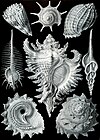Portal:Gastropods/Selected biography/7


Ernst Heinrich Philipp August Haeckel (February 16, 1834 – August 9, 1919), also written von Haeckel, was an eminent German biologist, naturalist, philosopher, physician, professor and artist who discovered, described and named thousands of new species, mapped a genealogical tree relating all life forms, and coined many terms in biology, including anthropogeny, ecology, phylum, phylogeny, and the kingdom Protista. Haeckel promoted and popularized Charles Darwin's work in Germany and developed the controversial recapitulation theory ("ontogeny recapitulates phylogeny"), claiming that an individual organism's biological development, or ontogeny, parallels and summarizes its species' entire evolutionary development, or phylogeny. Haeckel coined many now ubiquitous terms including "anthropogeny", "phylum", "phylogeny", "ecology". He proposed the kingdom Protista in 1866. His chief interests lay in evolution and life development processes in general, including development of nonrandom form, which culminated in his beautifully illustrated book Kunstformen der Natur (Art forms of nature), which includes over 100 detailed, multi-colour illustrations of animals and sea creatures, including the shells of a variety of marine gastropods. (Read more...)
